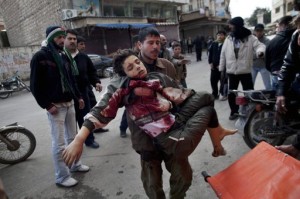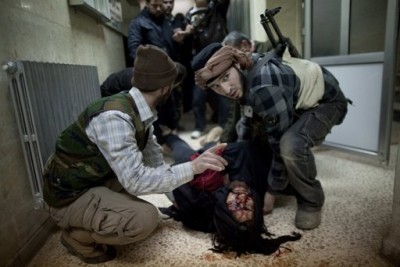 As the UN comes under increasing pressure to stop the violence in Syria, the organisation’s rights chief Navi Pillay said that she believes there is enough evidence to bring charges against the country’s leader.
As the UN comes under increasing pressure to stop the violence in Syria, the organisation’s rights chief Navi Pillay said that she believes there is enough evidence to bring charges against the country’s leader.
Navi Pillay is one of the most experienced international war-crimes experts. Before taking up her UN role as high commissioner for human rights, she served as a judge on the International Criminal Court (ICC) and the tribunal investigating the Rwandan genocide.
Under apartheid she became the first non-white woman to open her own legal practice in her native province of Natal in South Africa. She earned herself a reputation as a formidable campaigner for the rights of political detainees including Nelson Mandela.
As a lawyer of more than 45 years experience Mrs Pillay has learned to choose her words carefully. That is why her forthright comments on President Bashar al-Assad will arouse interest.
“They’ve gone for the children, for whatever purpose, in large numbers,” Mrs Pillay said. “It’s just horrendous. Children shot in the knees, held together with adults in really inhumane conditions, denied medical treatment for their injuries, either held as hostages or as sources of information.”
When asked if Mr Assad, as chief of Syria’s armed forces, bore command responsibility for attacks on the civilian population, she was unequivocal.
“That is the legal situation. Factually there’s enough evidence pointing to the fact that many of these acts are committed by the security forces, [and] must have received the approval or the complicity at the highest level,” she said.
“President Assad could simply issue an order to stop the killings and the killings would stop. So this is the kind of thing that judges hearing cases on crimes against humanity will be looking at on command responsibility.”
According to the UN, more than 9,000 people have been killed since the uprising began in Syria. Mrs Pillay described what was happening in the country as a “widespread and systematic attack against the civilian population”.
Children
One of the most notable features of the human rights abuses in Syria has been the killing and detention of children.
“They’ve gone for the children, for whatever purpose, in large numbers,” Mrs Pillay said. “It’s just horrendous. Children shot in the knees, held together with adults in really inhumane conditions, denied medical treatment for their injuries, either held as hostages or as sources of information.”
During her time as a judge in the Rwandan tribunal, Mrs Pillay heard evidence of children being murdered. But she said Syria represented something new in her experience.
“[In Rwanda] we saw footage of many children’s bodies, but not this level of incarceration and torture of children. They’re still incarcerated, and that’s what really troubles me,” she said.
“Why are they detaining children? It seems to be systematic and targeted. What troubles me now is that we don’t have access to these children.”
Although the UN Security Council has been briefed by the high commissioner on the scale of the abuses, its members have resisted referring the Syrian government to the International Criminal Court. Both Russia and China would block any attempt to do so.
Mrs Pillay believes a referral could save thousands of lives.
“I believe the Security Council has now been placed with reliable information which warrants referral to the ICC. I feel that investigation and prosecution is a crucial element to deter and call a stop to these violations.”
However there is a counter argument: referring Mr Assad to the ICC could simply make him more determined to hold on to power. Might a referral not simply get in the way of negotiations and prolong Syria’s agony?
“As the high commissioner for Human Rights, I question what kind of negotiation you would hold with [those] who’ve committed or who are committing serious crimes,” she said.
“And that is hardly any solution. One always has to seek justice and an end to impunity.”
There is also the issue of abuses committed by elements of the opposition.
Executions

Mrs Pillay said she condemned such acts unequivocally.
“Nothing entitles anyone to inflict killing and torture on others. International law absolutely forbids that,” she said.
Although the ICC has successfully prosecuted the Congolese warlord, Thomas Lubanga, the question of heads of state remains problematic.
President Omar al-Bashir of Sudan remains free, despite an ICC indictment on charges of genocide, war crimes and crimes against humanity.
What realistic chance is there of prosecuting Mr Assad? Mrs Pillay is hopeful.
“As far as I am concerned anyone today who commits serious violations, such as those occurring in Syria, will be held accountable because we now have a mechanism to hold them to account,” she said.
“And there is no statute of limitations, so people like him can go on for a very long time but one day they will have to face justice.”
BBC

Leave a Reply
You must be logged in to post a comment.